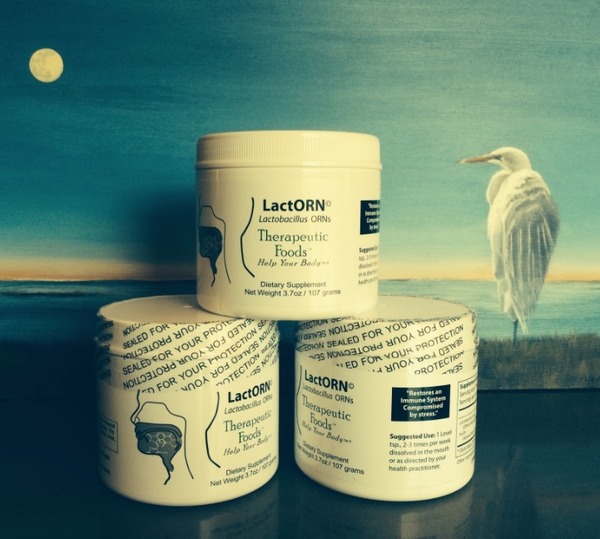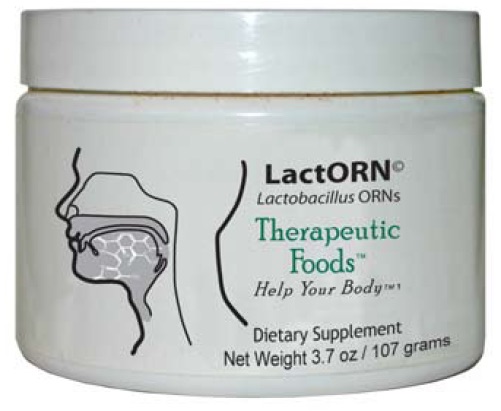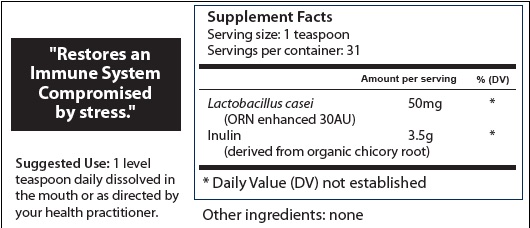ORNs- a missing ingredient in our diet
Dear Friends,
Our new LactORN probiotic supplement supports the restoration of an immune system compromised by stress, thereby increasing the ability of the body to fight infections.
As we have learned last week, our diets lack sufficient amounts of ORNs because we do not eat fermented foods. Furthermore, most of the yogurts and fermented vegetables available to us lack ORNs. This means that we seriously lack this important nutritional element that helps our bodies fight infection.
Marshall (2007) findings indicate that with ORNs, we restore an immune system compromised by stress—our abilities to fight infections are enhanced.
The field of psychoneuroimmunology has provided new insights to help understand the pathophysiological processes that are linked to the immune system. Work in this field has established that psychological stress disrupts the functional interaction between the nervous and immune systems.
Stress-induced immune dysregulation has been shown to be significant enough to result in health consequences, including reducing the immune response to vaccines, slowing wound healing, reactivating latent herpes-viruses, and enhancing the risk for more severe infectious disease.
Kanfer et al, 2011 observed high Cortisols to DHEAS ratios in bereaved older adults. High Cortisol to DHEAS levels is a stress marker. Neutrophil superoxide production was significantly reduced among the bereaved when challenged with E. coli.
The stress of bereavement exaggerates the age-related decline in HPA axis and combines with immune aging to further suppress immune function, which may help to explain increased risk of infection in bereaved older adults.
Godbout and Glaser (2006) found that the stress of hostile marital relationship interaction showed a 60% reduction in wound healing repair, which was associated with a decrease in proinflammatory Cytokine IL-1, IL-6 and TNF-alpha at the wound site.
Our immune system’s job is to protect us from pathogenic microbes and toxins. A weakened immune system leaves our bodies vulnerable to these pathogens and resulting infections.
References:
- Kanfer et al. (2011). Neutrophil function and cortisol:DHEA ratio in bereaved old adults. Brain, Behavior and Immunity. University of Birmingham, UK.
- Godbout, J.P., & Glaser, R. (2006). Stress-induced immune dysregulation: implications for wound healing, infectious disease and cancer. J Neuroimmune Pharm;1:421-427.
- Marshall, B

Sincerely yours,
Seann Bardell
BioImmersion.com
Clinical Note:
Our LactORN is the only probiotic supplement in the market that specifically grows the ORNs. Take one level teaspoon two to five times a week, depending on the weakness of the immune system. Continue to take the one of the probiotics mixes for a diverse microbial support of the GI, such as Original, No 7, or Supernatant. Add fibers such as the Beta Glucan or Energy Sustain for even a greater nutritional support.


Green Facts
Here’s more proof as to diet’s influence over our maintaining a healthy microbiome throughout our life. Just look at the elderly.
Claesson et al. (2012) state that, the gut microbiota composition correlates with diet and health in the elderly. Their microbiota composition significantly correlates with measures of frailty, co-morbidity, nutritional status, markers of inflammation and with metabolites in faecal water. The individual microbiota of people in long-stay care was significantly less diverse than that of community dwellers. Collectively, the data support a relationship between diet, microbiota and health status, and indicate a role for diet-driven microbiota alterations in varying rates of health decline upon aging.
Claesson et al. (2012). Gut microbiota composition correlates with diet and health in the elderly. Nature;488:178-184